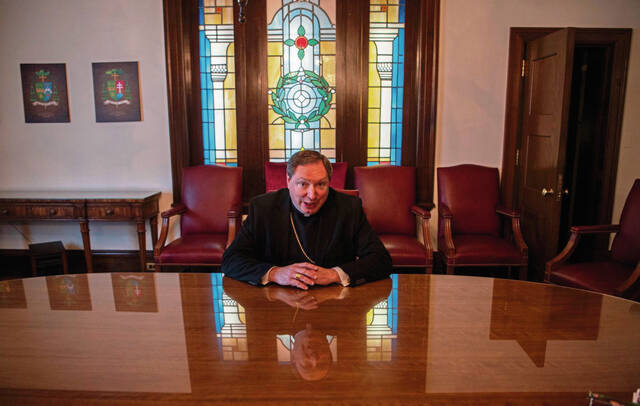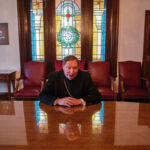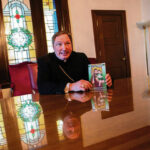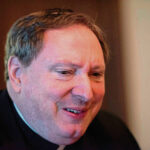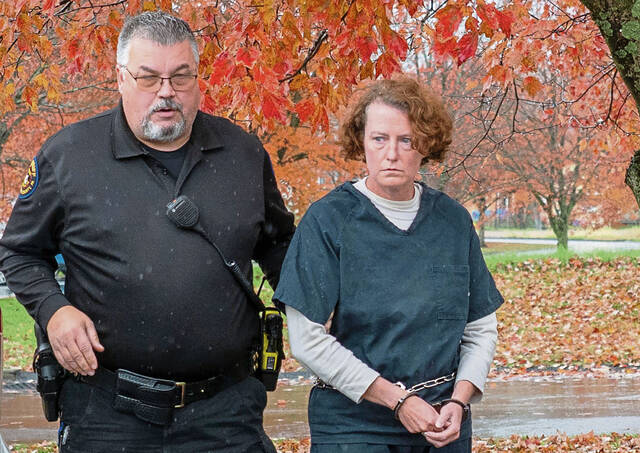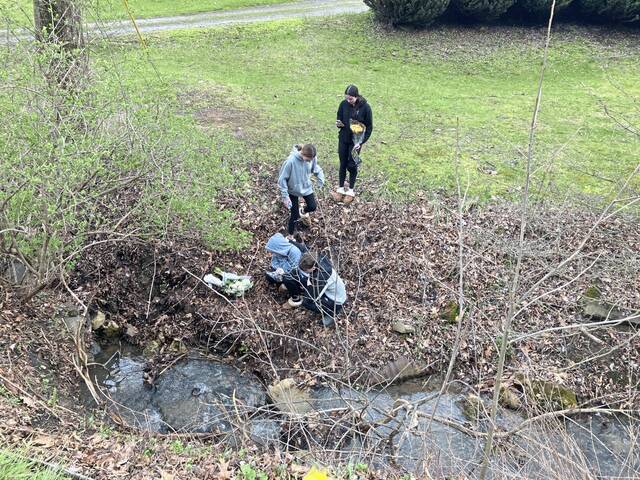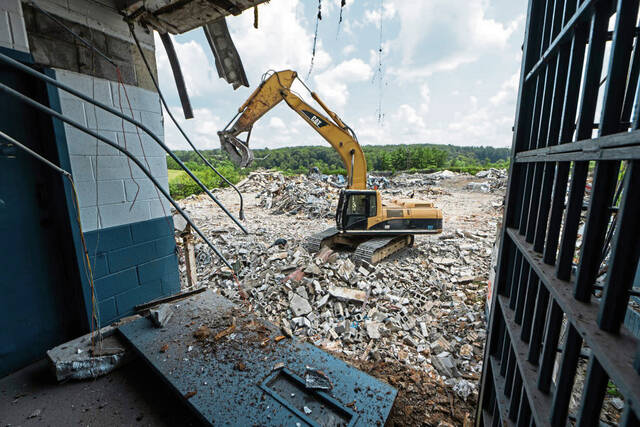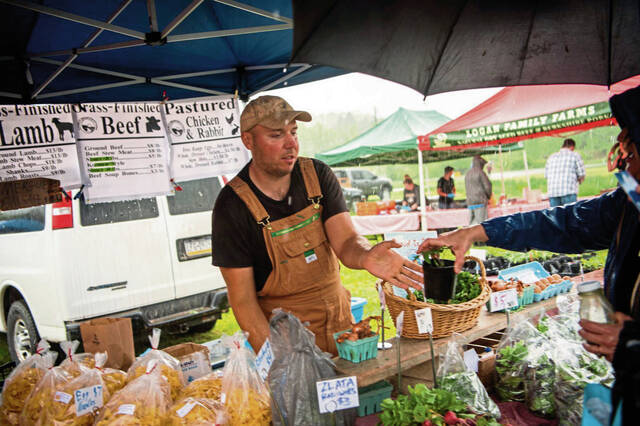When parishioners said they wanted increased support for children and young families in the Diocese of Greensburg, Bishop Larry Kulick took notice.
Kulick, who was ordained as bishop in 2021, shared his three-year vision for the diocese recently in a pastoral letter. The plan was formed through 18 listening sessions and two online surveys the diocese held to gather feedback from parishioners of all ages.
About 1,300 of the 135,000 parishioners across the diocese’s four counties — Armstrong, Fayette, Indiana and Westmoreland — responded to the sessions and surveys, he said.
With older parishioners expressing concerns about the future of the church and younger members requesting additional support, Kulick’s three-year plan is intended to be a road map to bolster diocesan efforts.
To that end, the diocese is aiming to hire 27 regional directors of faith and discipleship dedicated to each parish’s programs for youth and young families.
These programs — focused on deepening parishioners’ faith education — include Catechesis of the Good Shepherd, which prepares children for their first communion and confirmation ceremonies.
In 2022, there were more than 111,000 parishioners registered for these faith formation programs across the diocese — a 12% decrease from 2018.
Vincent Reilly, the diocese’s managing director of faith, family and discipleship, has worked with Kulick for more than a year to improve the quality of programming.
“(Bishop Kulick) is aware that the ‘better together’ mentality is going to get us further — that to try to have 78 parishes all hire a formation director that can lead in directions that are reaching the youth of today is very difficult,” Reilly said. “But, if we can have the parishes all combine their time and resources together, they can do that much more efficiently.”
Raising the next generation
Older generations of parishioners shared in listening sessions that they are worried about who will take their place in the pews and at the heads of church programs over the next several years, Kulick said. Parents expressed concerns about their children and grandchildren staying rooted in the Catholic faith.
“I don’t believe that, by any means, is unique to our Catholic perspective,” Kulick said of people stepping away from the church. “We look at sociological reports, we look at statistics — it’s a phenomenon that’s occurring across the board, and even one that is occurring not just with religious entities.”
Volunteer fire departments, Rotary clubs and Lions clubs across the country also are struggling to recruit young people, Kulick noted.
“You really see this across the gamut, that there really is an absence, many times, of younger people taking on some of those traditional roles in organizations and institutions and things like that,” he said.
Almost in tandem, students in the diocese’s Catholic school system told Kulick developing a deeper faith is important to them, and young couples — in the early stages of marriage and family development — requested greater support from their church communities.
Helping young families face the unique challenges before them will be a priority of the diocese for the next three years, Kulick said.
“There’s not nearly the intergenerational connectivity there was a generation or two ago. A lot of time, there’s not a close geographical proximity of family or extended family,” he said. “There’s the complicated nature of the workforce and the demands of the workforce on both parents today that are hugely different.”
A majority of the regional directors will serve as general specialists, Reilly said, focusing on programs that help people of all ages develop their faith. The remaining directors will have a special focus on working with children, teenagers, college students and recent graduates.
Each director will manage two larger parishes or six to eight small parishes in the diocese, he said. They will guide the paid professionals and volunteers currently in charge of the faith formation programs.
Though the diocese is seeking individuals with a college degree in Catholic theology, a recent partnership with Saint Vincent’s Institute for Ministry Formation will allow candidates to receive any critical education they do not have.
It also is important candidates have a passion for sharing their faith with others, Reilly said.
“We’re looking for people who have a love of faith and a love of the Lord, but also for people who are looking to be creative,” Reilly said. “Our young people are not just used to learning from a book.”
Six regional directors are expected to start by July, Reilly said. He declined to share the salary for the position.
Church involvement on the rise
Kulick also wants to capitalize on Mass and church event attendance.
Churches began reporting an increase in Mass attendance around Christmas, Kulick said. By Easter, every priest in the diocese noted a spike in attendance even higher than before the covid pandemic.
Parish programs also are seeing an increase, Kulick said, notably at the fish fry dinners that took place mid-February to late March. One church in Indiana County, for example, sold more than 900 meals four times throughout the Lenten season, he said.
The number of candidates pursuing initiation into the Catholic church also are bouncing back from a decrease during covid. The diocese’s Order of Christian Initiation of Adults program has doubled in number of participants this year, Kulick said.
The diocese was unable to provide the number of parishioners attending Mass each week and the number of candidates for the initiation program.
Kulick said he believes parishioners are looking to the church for support to navigate difficult life circumstances, busy schedules, political division and social tension.
“I do believe the current situation of our culture — however we want to look at it, define it — this tremendous polarization that’s happening, I think a lot of people are exhausted and are, in many ways, run dry,” he said.
Guiding parishioners
The Catholic church is meant to play a role in “forming the conscience” of parishioners, Kulick said — which is particularly prevalent with a highly contested presidential election on the horizon.
The church’s teachings are meant to inform how people vote and view political issues, Kulick said.
“Somehow, there’s this belief that I can set aside my own personal beliefs and what I believe is separated from my policy or how I act,” he said. “We would believe, at the heart of that, that’s a very dangerous dichotomy, because it really, I think, goes to the heart of integrity.”
The church is not meant to back one political party over another, Kulick said. Rather, each parishioner is meant to form their beliefs by examining Scripture and church teachings.
“You may get to a point where you know the Scriptures, you know the church’s teachings, you have taken things to prayer and there may be someone who, with a very well-informed conscience says, ‘I can or cannot accept this.’ That ultimately becomes between you and God, then,” Kulick said. “And even the church itself would say that’s between you and God.”
Parishioners have a responsibility to pray for guidance moving into the election cycle, Kulick said.
“We need unity, and I think the church can offer a great side of unity,” he said.
International support
The diocese also will welcome three new priests this year following their ordination, Kulick said, which will help support the parishes amid a national clergy shortage.
About a third of the priests in the diocese are international, missionary priests, Kulick said.
“I think sometimes in Western Pennsylvania, very unfairly, we get targeted as being extremely parochial, non-welcoming, isolated, insulated,” Kulick said. “I have just been so … edified at how these international priests and missionary priests have been so welcomed and accepted in our parishes, and loved.”
Kulick also shared a gratitude for the Ukrainian immigrants the diocese has helped relocate since July 2023 through a Catholic Charities initiative.
“They are so grateful for the opportunities. The people of the community have welcomed them,” Kulick said. “They really follow the model that they’re not looking for a handout. What they want is just a playing field to be able — with their hard work — to succeed. And what we’re finding is they’re finding that environment here in Western Pennsylvania and they are taking advantage of it.”


